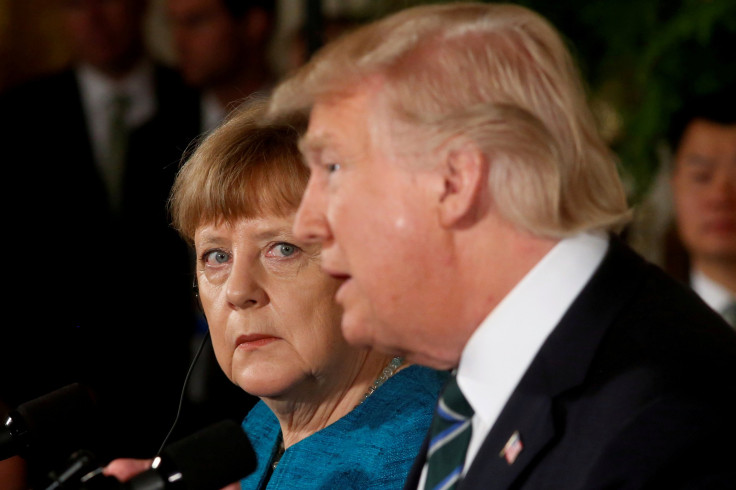NATO Funding: Trump Bills Merkel Billions For Money 'Owed' To Military Alliance, As White House Denies Report

The White House denied a Sunday report by British newspaper the Times of London, citing “German government sources,” that President Donald Trump charged German Chancellor Angela Merkel with what the unnamed officials called an “outrageous” $374 billion for money “owed” to the U.S. for its protection of fellow North Atlantic Treaty Alliance members.
White House spokesperson Michael Short told CNBC Sunday that the report, in which sources said Merkel would not respond to Trump’s alleged demand, was “false.”
Read: Countries Look To Make Montenegro Newest NATO Member To Deter Russian Influence In Eastern Europe
NATO’s 28 member countries are required to maintain a level of military spending equal to 2 percent of their gross domestic products each year to ensure that the nations, which are mainly concentrated in Europe, can effectively respond effectively to a threat against a fellow member.
In 2016, only five countries—the U.S., the U.K., Greece, Estonia and Poland—hit the target, compared to six in 2015. The U.S. has spent 3.6 percent of its GDP on defense, compared to Germany's 1.2 percent. The countries are not, however, contributing to any common NATO fund, but rather building up preparedness for an extreme event that might trigger Article 5 of the pact’s treaty, a mutual assistance guarantee that has only been invoked in the wake of the Sept. 11, 2001 terrorist attacks.
U.S. military spending also dwarfs that of the rest of the world, reaching higher than those of the next seven countries combined in 2015, in part because, as the Washington Post pointed out in May of that year, the U.S. “is bound by treaties to defend a quarter of humanity.”
Read: Rex Tillerson Avoids NATO Meeting, Will Visit Moscow In April
Throughout his campaign, Trump expressed his desire to renege on those commitments, telling the New York Times in July that “you can’t forget the bills” and that the U.S. wouldn’t follow through on its obligations—such as that of Article 5—to defend fellow member states under attack unless “they fulfill their obligations to us.” More recently, in mid-January, he told Germany’s Bild newspaper and the Times of London that he believed NATO to be “obsolete.”
During a joint press conference following a March 17 meeting with Merkel at the White House, Trump took a more diplomatic approach, reiterating his “strong support for NATO” and thanking her “for the German government’s commitment to increase defense spending and work toward contributing at least 2 percent of GDP.”
© Copyright IBTimes 2024. All rights reserved.






















